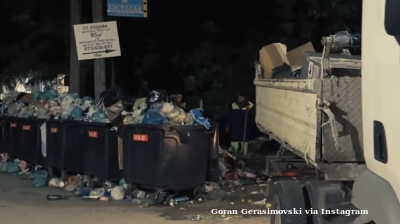Russia expecting the grain harvest to tumble by 20mn tonnes as Global Warming pushes its fertile grain belt northwards

Russia is on course to see its grain harvest tumble by 20mn tonnes as its grain belt bakes in a Climate Crisis heatwave and Global Warming shifts its fertile grain belt northwards.
Russia’s Institute for Agricultural Market Studies (IKAR) is projecting a 2025 grain harvest of around 130mn metric tonnes — roughly the same as, or even slightly more than, in 2024, which came in at 126mn tonnes, according to Rosstat. But that’s well down from all-time high peak yields of recent years.
While no official tonnage has been released for the 2025/26 season, IKAR has maintained its 2024/25 estimate at around 130mn metric tons, suggesting a broadly stable trend barring major weather disruptions during the upcoming sowing and wintering period, but tonnage has already been hit by an exceptionally hot summer. In its latest public statements, IKAR said it expects grain export volumes in 2025/26 to remain strong, supported by high international demand, stable logistics via Black Sea ports, and competitive pricing due to the weak rouble – but analysts are growing increasingly sceptical this goals will be achieved. (chart)
The state has been pouring money into agriculture in recent years, both for national security reasons and to make some extra money. Russian President Vladimir Putin proudly reported an all-time record harvest of 153mn-155mn tonnes of grain in 2023, way more than enough to cover the next planting season, meet domestic demand, and send some 50mn tonnes overseas to export markets.
This year’s harvest will be down by some 20mn tonnes from that peak. Given parts of Russia are now warming seven-times faster than the rest of the world, it is not yet clear if this change is permanent, or a one off. Scientists are warning of rising food insecurity as a result of the accelerating Climate Crisis, but it is not clear how badly this affects Russia as the climate will make some frozen northern regions arable, like those along the Chinese border.
Russia earned a whopping $42bn from grain exports in 2023, with wheat accounting for half of that, making it one of Russia’s most valuable export products. At $425bn, oil and gas still accounts for the lion’s share of export revenues, followed by metals at $45bn, but grain has overtaken arms exports ($13bn in 2023) to become the third largest item on the docket.
|
Russia's export revenue by sector in 2023 |
||
|
Rank |
Sector |
Revenue (USD) |
|
1 |
Oil and gas |
$425bn |
|
2 |
Metals and metal products |
$45–50bn |
|
3 |
Grain and agriculture |
$41.6bn (wheat: $20bn) |
|
4 |
Weapons and military equipment |
$13bn |
|
5 |
Coal |
$12–13bn |
|
source: bne IntelliNews |
||
Blistering heatwave
Russia’s two key wheat-producing regions have been sweltering in a blistering heatwave, as Rostov suffers a second consecutive year of drought while neighbouring Stavropol prepares for a potential record harvest. The divergence may see Stavropol overtake Rostov as the country’s largest wheat-growing region, according to crop forecasts.
Rostov Governor Yuri Slyusar has warned that the region’s 2025 harvest could fall by 20% from last year’s total of 10.1mn metric tons, Reuters reports, marking the lowest output since 2015. A state of agricultural emergency has been declared in ten districts, allowing the regional administration to expedite state support and compensation to affected farmers.
Seedlings have been affected by drought since last autumn and the wheat is weak. This year, crops also suffered from a frost, and now the drought is finishing it off, according to local reports.
Spring frosts were less severe than in previous years, but persistent dryness has become the dominant threat, Reuters reports. Brief rainfall in May was insufficient to restore moisture to the soil, leaving crops vulnerable as harvesting begins this month.
Chertkov district has seen some of the most severe declines. Wheat yields there dropped by 61% in 2024, to just 1.7 metric tons per hectare—compared to about 3.4 tons per hectare in the United States. Zolotaryov pointed to thin green shoots emerging from parched earth and noted that stem growth was well below seasonal norms.
Yields tumbling
Grain productivity in places like Krasnodar Krai and the Rostov region have fallen by about a quarter compared to 2024. Livestock producers in the region are already discussing reductions to the cattle herd amid feed shortages. Despite the decline, IKAR says that the reduced output will still be sufficient to meet domestic needs, supply the next planting season and support exports, albeit at reduced levels.
The worst of the losses have been concentrated in key agricultural regions such as Krasnodar Krai and the Rostov region – home to Russia’s legendary black earth (chernozem) – due to severe drought. In some of the most affected districts, including Kanevskoy, Pavlovsky and Yeysky, yields have dropped to just 20–30 centners per hectare—two to three times below the usual average. Wheat yields in the Kuban have dropped from 64.7 to 48.8 centners per hectare. Barley is down 21%, while peas, maize and sugar beet are also underperforming.
According to Konstantin Yurov, deputy chairman of the People’s Farmer association, Krasnodar alone has lost 2.8mn tonnes of grain, amounting to damages of RUB42bn ($510mn). Rostov’s losses are expected to be on a similar scale. “Farmers in the Kuban and Don regions have missed out on RUB70–80bn rubles,” Yurov told RBK, or between $855mn and $978mn.
One of the effects of the rising temperatures has already been to push the most fertile land northwards. Soil productivity is increasingly stronger in areas such as Ryazan, Kursk and Tambov, which have not experienced the same drought conditions.
Stavropol, situated just east of Rostov, has benefited from more favourable weather in recent months. Local agronomists expect bumper yields and a potential record wheat output in 2025, allowing Russia to maintain its position as the world’s largest wheat exporter.
Compact Harvest
This summer’s drought is among the worst in decades. A state of emergency has been declared in 37 districts across southern Russia, and thousands of farms have reported severe crop failure.
On July 15, Dmitry Rylko, general director of IKAR, introduced the term “compact harvest” in an interview with agricultural magazine Pole.rf, describing the situation in cautious terms. The phrase has since drawn criticism online for downplaying the severity of the crisis. “What exactly is a compact grain harvest supposed to mean?” one commenter asked. “Like, ‘there’ll be nothing to eat, but keep your mouth shut’? And let’s not even talk about quality,” Meduza reports.
A farmer in the Rostov region told Novye Izvestia that the language reflected a predictable government response: “Poorly managing the agricultural sector—and then scrambling to reframe the consequences.”
On July 15, Dmitry Rylko, the general director of Russia’s Institute for Agricultural Market Studies (IKAR), introduced a new euphemism in an interview with the agricultural magazine Pole.rf: “compact harvest.”
The term is the latest addition to a growing lexicon of state Doublespeak aimed at recasting harsh realities in vague and gentler terms. Since the start of the full-scale war, pro-government media and officials have increasingly used phrases like “negative growth” instead of “decline,” or “a loud bang” in place of “explosion,” Meduza reports.
Potato crisis
Grain is not the only agricultural product to be affected. Both Russia and Belarus are suffering from a potato crisis that has seen prices for a kilo of spuds triple in recent months.
The vegetable — consumed in Russia at some of the highest rates in the world — has become 2.8 times more expensive over the past year, Meduza reports. As of early May 2025, the average retail price for a kilogram of potatoes reached an all-time high of over RUB85 a kilo, up from RUB30 a kilo in May 2024, according to Rosstat. And prices are still rising. And that’s just the national average: in some regions, shoppers have been stunned to see prices as high as RUB200 per kilo.
In general, food inflation in Russia has been volatile over the past two years, driven by supply disruptions, the impact of Western sanctions, and increasingly unstable weather patterns.
In 2023, food inflation averaged 3.9% over the year, according to Rosstat – relatively moderate compared to the broader consumer price index (CPI), which stood at 7.4% for that year, thanks to a strong harvest. In the first half of 2024, food inflation accelerated sharply, reaching 8.2% year-on-year in June 2024. The spike was driven by rising prices for vegetables, dairy products, and especially potatoes.

President Vladimir Putin has publicly acknowledged the potato shortage, while Deputy Prime Minister Dmitry Patrushev admitted the government “was too slow to implement measures to stabilise the food market.”
The vegetable — consumed in Russia at some of the highest rates in the world — has become 2.8 times more expensive over the past year, Meduza reports. As of early May 2025, the average retail price for a kilogram of potatoes reached an all-time high of over RUB85 a kilo, up from RUB30 a kilo in May 2024, according to Rosstat. And prices are still rising. And that’s just the national average: in some regions, shoppers have been stunned to see prices as high as RUB200 per kilo.
The potato crisis has also spilled over in neighbouring Belarus where President Alexander Lukashenko roasted his top officials at a televised Cabinet meeting for failing to contain soaring potato prices in March.
“You didn't do it and you'll answer for it,” Lukashenko said. “It turns out we don't have potatoes. How much has the price of potatoes gone up? Can't we produce the right amount of potatoes, put them in the cellar and then sell them to people?” "Why? It doesn’t store well? I warned you last year how it should be stored. I gave you the example of Shuleyko from Alexandria. They built a storage facility. God forbid I drive by and stop there, and it’s not filled to the ceiling."
Sliding back into increasing Soviet-era economic habits, Lukashenko tried to cap the price of potatoes, but all that happened was Belarusian farms just exported their potatoes to Russia where they could get inflated market prices making the Belarusian potato crisis worse.
A similar thing has happened with butter, which has seen a pack of Russian made butter double and even triple in price this year, to the point where supermarkets were stationing security guards by the daily counter to prevent ballooning shoplifting of butter by outraged customers and a burgeoning black market in stolen butter.
bneGREEN

TEHRAN BLOG: 200 days without rain
Tehran's water crisis is about decades of chaotic urban expansion, unregulated groundwater extraction, and infrastructure so decrepit that hundreds of millions of cubic metres vanish before reaching a single tap.

The Arctic and Antarctica record "off the charts" heat as polar warming accelerates
Parts of both the Arctic and Antarctic have experienced historically high temperatures in recent weeks, with weather stations in East Antarctica recording record-breaking warmth for the month of October, alarming climate scientists.

Giant glacier chunk breaks away in Tajikistan, mountain villages put on alert
Situation serves as reminder that climate crisis threatens to wreak havoc in Central Asian country.

Singapore’s green pivot – headline grabbing but still limited
Forays into offshore wind via regional cooperation with neighbours, and forward-looking bets on hydrogen and low-carbon fuels are making headlines, but the scale required to wean a heavily gas-dependent system off fossil fuels is still daunting.



